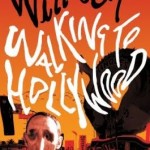[Grove Press; 2011]
by Scott Beauchamp
Before reading “Walking To Hollywood“, my knowledge of Will Self was limited to his breathless and adoring introduction to Alisdaire Gray’s 1982, Janine.I was also vaguely aware that he had gotten into some legal trouble for doing heroin on John Major’s plane.I guess if pressed, I would have described him as some kind of modern day British gonzo journalist, which is akin to calling him a literary Luddite. How uncomfortable is it when you sense that someone is appropriating obsolete forms of rebellion?
Burroughs. Nabokov. Hunter S. Thompson. Ballard. These are the pins that Self wears on his leather jacket. Lucky for us, Self is no awkwardly self-conscious boring bureaucrat, but instead a hyper-literate, hilariously insecure narcissist. The sentences of this largely “autobiographical” work are lush and twisted. There doesn’t seem to be an inch of his life that isn’t intimately connected to its usually more disgusting polar opposite. Imagine high art references mixed with drug slang. Hollywood dream factories described on the same page as simulated gang rape. Love and feces. All things melt together and connect at the vortex that is Self, sucking in the culture around him like a black hole. Not even the identities of passing strangers can escape the event horizon of his ego.
Written in three parts, “Walking to Hollywood” can be read as a surreal triptych, with each section using partly autobiographical accounts to illustrate different psychological maladies. In the first section, Self (who, of course, is not the real Will Self, but a writer sharing the author’s biography who is also named Will Self) recounts his relationship with Sherman Oaks. Oaks, besides sharing his name with an LA suburb, is a sculptor suffering from achondroplastic dwarfism. His sculptures are giant statues of himself, constructed in different places all over the world. His old friend Self is obsessed with scale and size, questioning the usefulness of measurements and amounts, convinced of their arbitrary nature. There’s a desperateness to the narrative. An intentionally poorly hid plea for help. The pathology associated with this section is obsessive-compulsive disorder, and the odd sensations of guilt that seem to accompany it. Sometimes it’s as if Sherman Oaks himself is the physical manifestation of the author’s guilt, a constant reminder to Self of the distorted proportional senses of his own ego and talent.
The second part, and really the meat of the novel, moves deeper into the psychosis of Self while on his walking exploration of Hollywood. During his foot journey to solve the mystery of ‘who killed the movies’, he spirals into a complexly entertaining series of schizophrenic delusions, imagining that in every encounter, the people he meets are played by actors. Bret Easton Ellis is played by Orson Welles. His agent is Elen DeGeneress. Homeless people are played by Toni Morrisson, Salman Rushdie, and others. Will Self is played by either Pete Postlethwaite or David Thewliss. At one point he grows Laura Harring’s breasts. If it sounds overwhelming, that’s because it is. Each sentence invites you to reread and laugh and then it sort of stumbles into the next in a frenzied rush towards the bottomless pit that is the center of our culture. The culture of spectacle becomes the culture of self. Double-entendre regretfully intended.
The final section is set on the coast of Holderness in Yorkshire, which is literally crumbling into the ocean at a pretty alarming rate. It’s the perfect setting for a journey into memory loss, and contains what I think is some of the more poignant writing of the novel. Of course, this isn’t to say that Self completely changes tone. The section, despite its tragic beauty, also contains some hilariously mean-spirited descriptions of the locals.
The novel ends with a quick mention of a murder that took place near Self’s home, as well as the deaths of J.G. Ballard and Self’s father-in-law. Self, never one to hedge, makes it clear that he desires not longer life, but life-everlasting. It’s safe to say that with such strong, moving, and hilarious writing, he’ll achieve some form of that. Sadly, it won’t be the one that he truly longs for. “I left the book lying on the table – what did narrative have going for it anyway – only smelting kryptonite out of coincidence so as to trap us superheroes in the mundane.”
This post may contain affiliate links.









